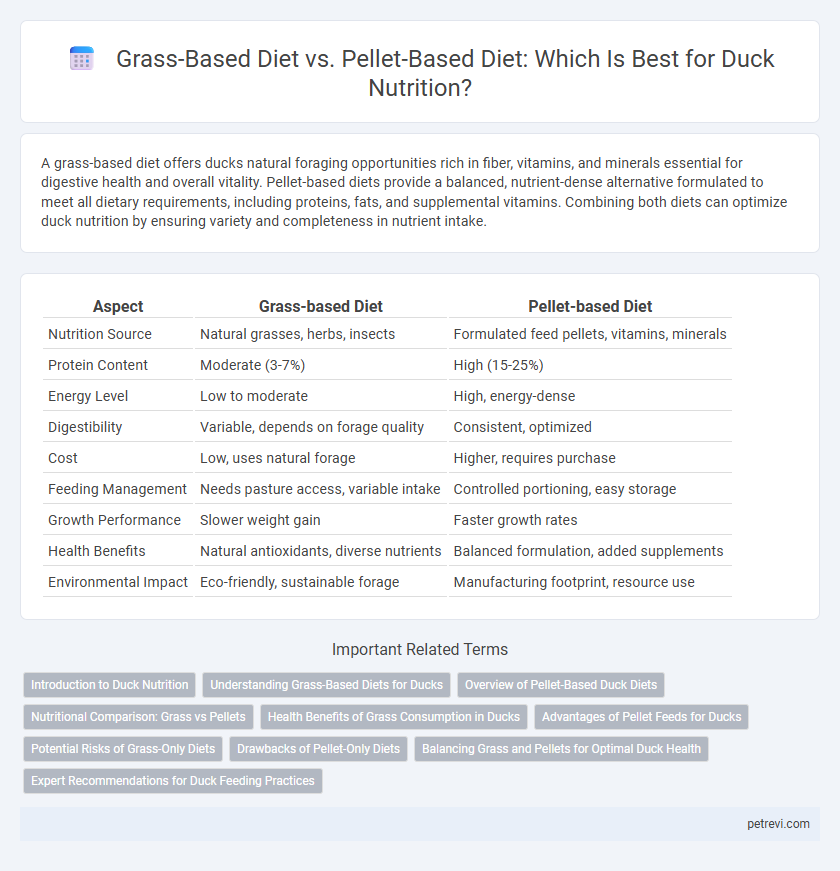A grass-based diet offers ducks natural foraging opportunities rich in fiber, vitamins, and minerals essential for digestive health and overall vitality. Pellet-based diets provide a balanced, nutrient-dense alternative formulated to meet all dietary requirements, including proteins, fats, and supplemental vitamins. Combining both diets can optimize duck nutrition by ensuring variety and completeness in nutrient intake.
Table of Comparison
| Aspect | Grass-based Diet | Pellet-based Diet |
|---|---|---|
| Nutrition Source | Natural grasses, herbs, insects | Formulated feed pellets, vitamins, minerals |
| Protein Content | Moderate (3-7%) | High (15-25%) |
| Energy Level | Low to moderate | High, energy-dense |
| Digestibility | Variable, depends on forage quality | Consistent, optimized |
| Cost | Low, uses natural forage | Higher, requires purchase |
| Feeding Management | Needs pasture access, variable intake | Controlled portioning, easy storage |
| Growth Performance | Slower weight gain | Faster growth rates |
| Health Benefits | Natural antioxidants, diverse nutrients | Balanced formulation, added supplements |
| Environmental Impact | Eco-friendly, sustainable forage | Manufacturing footprint, resource use |
Introduction to Duck Nutrition
Ducks thrive on a balanced diet that supports their growth, feather quality, and overall health. Grass-based diets provide natural foraging opportunities rich in fiber, vitamins A and K, and essential amino acids, promoting digestive health and natural behaviors. Pellet-based diets offer precise nutrient formulation, including optimal levels of protein, energy, calcium, and phosphorus, ensuring consistent growth rates and egg production in commercial and domestic settings.
Understanding Grass-Based Diets for Ducks
Grass-based diets for ducks provide high fiber content and natural foraging opportunities, enhancing their digestive health and promoting natural behaviors. These diets supply essential nutrients such as vitamins A and E, carotenoids, and antioxidants, which improve immune function and feather quality. In comparison to pellet-based diets, grass-based nutrition supports gut microbiota diversity and reduces the risk of obesity and metabolic disorders in ducks.
Overview of Pellet-Based Duck Diets
Pellet-based diets for ducks provide a nutritionally balanced and convenient alternative to grass-based feeding, offering precise control over protein, vitamins, and minerals essential for optimal growth and egg production. These formulated pellets often include ingredients like corn, soybean meal, and added supplements that ensure consistent nutrient intake, reducing variability seen in pasture foraging. Pellet feeding enhances feed efficiency and supports intensive farming systems by minimizing waste and simplifying rations compared to a grass-only diet.
Nutritional Comparison: Grass vs Pellets
Grass-based diets for ducks provide natural forage rich in fiber, vitamins A and K, and antioxidants, promoting digestive health and enhancing immune function. Pellet-based diets offer a balanced, controlled nutrient profile with consistent protein, energy, and minerals essential for growth and egg production. Studies indicate that while grass improves gut microbiota diversity, pellets ensure precise nutrient intake, supporting optimal performance and weight gain.
Health Benefits of Grass Consumption in Ducks
Grass-based diets provide ducks with higher levels of essential nutrients such as vitamins A, E, and K, promoting better immune function and feather quality. The natural fiber content in grass supports healthy digestion and reduces the risk of obesity by encouraging natural foraging behavior. Unlike pellet-based diets, grass consumption enhances gut microbiota diversity, contributing to improved overall health and disease resistance in ducks.
Advantages of Pellet Feeds for Ducks
Pellet feeds for ducks provide a balanced and consistent nutrient profile, ensuring optimal growth and health through precise formulation of proteins, vitamins, and minerals. These feeds reduce waste compared to grass-based diets, improving feed efficiency and lowering overall feeding costs. Pellet-based diets also minimize exposure to parasites and contaminants commonly found in natural grazing environments, promoting better disease resistance and biosecurity.
Potential Risks of Grass-Only Diets
Feeding ducks a grass-only diet poses potential nutritional risks due to insufficient protein, vitamins, and minerals essential for growth and egg production. Nutrient deficiencies can lead to weakened immune systems, poor feather quality, and decreased overall health. Supplementing grass with balanced pellet-based feeds ensures ducks receive adequate nutrients for optimal performance and longevity.
Drawbacks of Pellet-Only Diets
Pellet-only diets for ducks often lack sufficient fiber, leading to digestive issues and poor gut health. These diets may also result in nutrient imbalances due to the absence of natural foraging elements such as grasses and insects. Overreliance on pellets can reduce natural behaviors critical for mental stimulation and physical conditioning in ducks.
Balancing Grass and Pellets for Optimal Duck Health
Ducks require a balanced combination of grass-based and pellet-based diets to ensure optimal health, as grass provides essential fiber and natural nutrients while pellets supply concentrated proteins and vitamins for growth. Studies indicate that incorporating at least 40% pasture forage in their diet enhances digestive efficiency and immune function, reducing reliance on commercial feeds. Optimal duck nutrition typically involves a 60:40 ratio of pellets to fresh forage, supporting weight maintenance and overall vitality.
Expert Recommendations for Duck Feeding Practices
Experts in duck nutrition emphasize that a grass-based diet provides essential fiber and natural foraging benefits, promoting digestive health and natural behavior. Pellet-based diets offer a balanced and consistent supply of vitamins, minerals, and proteins tailored to growth stages and production goals. Combining both diet types is often recommended to optimize nutrient intake and overall duck well-being.
Grass-based Diet vs Pellet-based Diet for Duck nutrition Infographic

 petrevi.com
petrevi.com